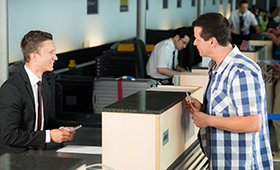More English, more security, more service
Commercial occupations in air transport updated
16/2017 | Bonn, 09.05.2017

The two commercial training occupations in air transport – “Air traffic management assistants” and “Service employees in air traffic” – are taking off again. On behalf of the Federal Government, and together with social partners and experts from compa-ny practice, the Federal Institute for Vocational Education and Training (BIBB) has comprehensively updated this vocational education and training. They now form an occupational group but remain independent.
There are significant changes, in particular for the air traffic management assistants. In the updated training content, their activities continue to relate to the commercial back office such as controlling, marketing, sales, purchasing and personnel. However, control relating to all aspects of terminal processes is also included. By contrast, the training for service employees in air traffic primarily targets customer advice and the focus on service. For example, they calculate flight prices for customers, sell air tickets, reissue these, make reimbursements and offer a range of additional services.
In both forms of training, key importance will be attached in future to knowledge of English. This is explicitly addressed in the updated training regulations. There is also a greater emphasis on security aspects, for example as a result of changes in standards relating to operational security and defence against external threats. The examination requirements are also changing: In future, the extended final examination will apply to air traffic management assistants - examinations which count towards the final ex-amination will take place as early as the middle of the second year of training. In contrast, service employees in air traffic keep the traditional form of intermediate and final examination as these have proved to be successful in the past.
The restructuring was preceded by an evaluation involving case studies and a telephone survey of company-based experts relat-ing to tasks, areas of operation, fields of activity and areas where the two occupations overlap. In line with recommendations, the structure of both training courses with their different areas of responsibility and activity content have been retained. Howev-er, in future, they will form one occupational group with the opportunity of joint teaching for at least one year. The reason for this, amongst other things, was the low training numbers: For air traffic management assistants there were only 54 new contracts in 2015, and for service employees in air traffic there were 60 new agreements against a background of a falling underlying trend. The expectation is that this will change following the comprehensive amendments. The modernisation means that both occupa-tions are once again up to date and more attractive.
Following the training, the commercial air traffic occupations offer a range of options for continuing education and training, for example business administrator for freight transport and logistics, business administrator for passenger transport and mobility, or tourism management administrator.
The now updated training regulations for the company-based element and the framework curricula for the school-based section of the training courses - which is tailored to the company-based element - will enter into force on 1 August 2017 and replace the existing training regulations.
Implementation aids from the BIBB series “Structuring training” are likely to be available in the summer for the new regulations. In the future, the occupational profiles will be available in a EUROPASS Certificate Supplement in German, English, and French and will help the trained skilled workers to realize their professional potential across Europe.
The training courses are placed at level four in the German Qualification Framework (DQR). This classification helps skilled workers and foreign employers when assessing the quality of the training as part of application procedures.
Contact partner:
Dr. Anke Kock
Specimen copy requested if printed.